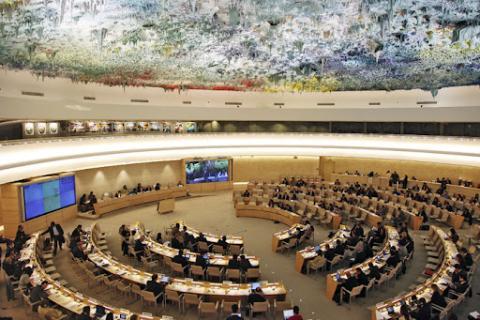
On 2 October 2023, Alkarama submitted its alternative report to the Committee against Torture (CAT) in view of Egypt's upcoming review. This will be the 6th review by the independent experts of the Committee responsible for monitoring the State party's implementation of the Convention against Torture and Other Cruel, Inhuman or Degrading Treatment or Punishment, ratified in 1986.
In this context, Alkarama expressed its main concerns, drawing the Committee's attention to the seriousness of the human rights situation in the country, and made its recommendations.
In its report, it stressed that the human rights situation in Egypt, which had already been of concern since its last periodic review by the CAT in 2002, had seriously deteriorated over the years and in particular since the military takeover by General Abdel Fattah al-Sisi on 3 July 2013.
Systematic practice of torture in detention
Since Egypt's last review, Alkarama has submitted numerous cases to the Special Rapporteur on torture and other cruel, inhuman or degrading treatment or punishment, highlighting a pattern of enforced disappearance and systematic torture targeting arrested and detained persons, particularly during the preliminary investigation phase.
On the other hand, Alkarama raised in its contribution the issue of domestic legislative gaps, in particular the absence of the criminalisation of torture and the inadequacy of guarantees to prevent and properly address the problem of torture and ill-treatment in Egypt.
These cases demonstrated that torture is routinely and pervasively practiced and takes various forms: insults, humiliation, threats of murder and rape against the victim and her relatives, slaps, blows with metal pipes on different parts of the body, hanging from the ceiling, sexual violence and electric shocks, especially on sensitive parts of the body.
Egypt's Refusal to Acknowledge Systematic Torture
Alkarama also expressed its deep concern about Egypt's refusal to acknowledge the systematic practice of torture in the country.
In March 2012, Alkarama submitted a communication to the Committee, requesting the experts to initiate an investigation within the framework of the procedure provided for in article 20 of the Convention against Torture, which allows the Committee's experts to initiate the investigation if they receive "reliable information which appears to them to contain well-founded indications that torture is systematically practised on the territory of a State Party". The complaint was corroborated by numerous testimonies of torture documented by Alkarama.
Between 2012 and 2016, Alkarama sent eight other monitoring reports to the CAT confirming the systematic nature of torture, as well as the lack of political will on the part of the authorities to take adequate legislative and political measures to put an end to it.
The Committee against Torture considered that it had received sufficient evidence to conclude that torture had remained systematic despite several changes of government, stating in its report that the practice is "habitual, widespread and deliberate" in Egypt. The UN Committee made several urgent recommendations to Egypt, including ending the practice of torture in detention centres, implementing a zero-tolerance policy to end impunity for perpetrators, and ensuring that the authorities publicly condemn torture and ill-treatment.
None of the successive governments since then has cooperated with the Committee and implemented these recommendations.
Violation of the human rights of detainees
Alkarama has demonstrated in its contribution and through several concrete cases, that procedural safeguards aimed at preventing ill-treatment and torture in detention, even when enshrined in Egyptian law, are never respected in practice. Detainees are deprived of basic legal guarantees from the outset of their detention, including access to a lawyer and an independent medical examination, the right to inform their relatives of their detention, and the right to be brought before an independent judicial authority within a reasonable time.
Excessive use of violence
Following the military coup in Egypt, Alkarama observed with great concern an escalation of violence, especially in the context of peaceful protests that resulted in injuries and even deaths of many civilians.
The killing of more than a thousand peaceful protesters in Rabaa Square is certainly the most glaring example of this brutality and the impunity that followed.
Alkarama has therefore devoted part of its report to this tragic massacre on the occasion of its tenth anniversary. The report recalled that, despite calls from thousands of families of those killed during the protests, none of these extrajudicial executions have been investigated by the authorities, reinforcing the prevailing climate of impunity in the country.
Alkarama, which regrets the lack of justice for the victims of the Rabaa massacre, despite the decade that has passed, also mentioned several cases of seriously injured survivors arrested, brought before the courts and sentenced to long prison terms or even death sentences.
Violations committed under the pretext of counter-terrorism
Under the pretext of "fighting terrorism", Egypt has adopted several laws that vaguely define the concept of "terrorism" and, as a result, significantly expand its scope to include non-violent acts of political dissent.
Alkarama has demonstrated, through documented cases previously submitted to the United Nations mechanisms, that this excessively broad definition of terrorism is used to stifle any form of dissent, especially since the political party "Muslim Brotherhood" was designated as a "terrorist organization" in 2013.
The lack of political will on the part of the authorities to implement and enforce the provisions of the Convention, their reluctance to comply with their obligations under the Convention, and the impunity enjoyed by perpetrators of violations have all contributed to the prevalence of torture and ill-treatment in Egypt.
Alkarama, which will pay particular attention to the Committee's examination of Egypt, hopes that a constructive dialogue with the Egyptian authorities will make it possible to address these concerns.
